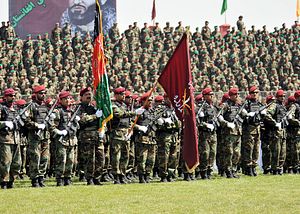Afghan security forces are in one hell of a fight with Taliban insurgents this year. According to statistics compiled by an American-led coalition official in the country and seen by the New York Times, casualties rates are up 50 percent compared to the previous year.
So far 4,100 soldiers and police officers have been killed and about 7,800 wounded with months of heavy fighting still ahead. In comparison, in all of 2014 around 5,000 members of the Afghan security forces were killed battling the ongoing insurgency.
In March 2015, the commander of U.S. Forces in Afghanistan, Gen. John F. Campbell, testified in front of the U.S. House of Representatives Armed Services Committee on the war and combat readiness of Afghan security forces (see: “Quo Vadis Afghanistan: General Campbell Testifies on the Hill”), and also discussed Afghan losses:
A high ANDSF [Afghan National Defense and Security Forces] attrition rate, which accounts for casualties and all other losses to the force, has had an impact on combat readiness. If present rates continue, it will pose challenges to force development over time. The main causes of ANDSF attrition are assessed as poor leadership; high operational tempo; inadequate soldier/police care; and poor force management.
According to a retired Afghan general interviewed by the New York Times, the current casualty rates are, among other things, caused by the lack of an offensive spirit among troops. “We are in a passive defense mode — we are not chasing the enemy. Units get surrounded, and we don’t send them support, so they are killed,” he says.
The New York Times reports that Afghan security forces are struggling to maintain a military stalemate and are slowly losing ground to extremist forces in the country:
A range of interviews with army and police commanders and regional government officials in crucial battleground areas indicated that even though the Afghan forces have nominally met their goal of maintaining a presence in every city and all but a very few district centers, they are often functionally penned in by the Taliban, rarely mounting patrols, much less taking territory back.
Nevertheless, it is unlikely that insurgent forces will be able to dislocate them from key geographical positions and major cities during this year’s fighting season.
The United States has so far spent $60.7 billion to train, equip and pay 195,000 members of the Afghan army and 157,000 members of the police force. However, as I reported before (see: “Taliban Onslaught: What Is Happening in Afghanistan?”) the number of troops and police is not reliable according to John Sopko, the special inspector general for Afghanistan reconstruction (SIGAR).
Indeed, the United States and NATO have no clear idea how many Afghan soldiers and police are currently engaged in combating Taliban insurgents (see: “Pentagon Declassifies Information on Afghan Security Forces”). The New York Times reports that desertion remains a critical problem for government forces.
A June 2015 report by the U.S. Department of Defense discussing the progress of the war in Afghanistan admits that the performance of Afghan security forces “was uneven” during combat operations. However, the paper also points out that government forces “continue to demonstrate that they are capable and can undertake relatively sophisticated operations with minimal coalition advice and assistance.”
Additionally, the report observes:
Overall, the ANDSF’s most critical gaps remain in aviation, intelligence, and special operations, all linked to the ANDSF’s targeting capability. These gaps will endure for some time, even with the addition of key enablers.
Last, it predicts that casualty rates will “increase in the next several months.” It appears that Afghan security forces will have a tough fight ahead of them in the next couple of months.
































